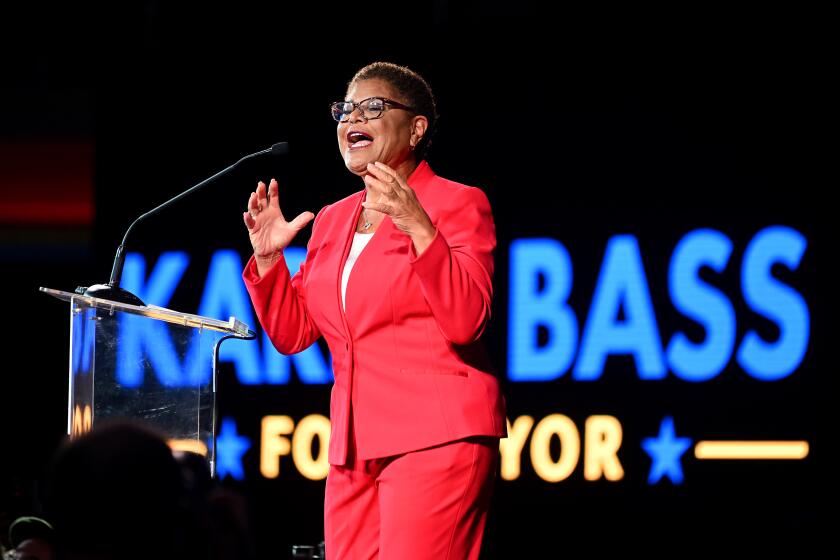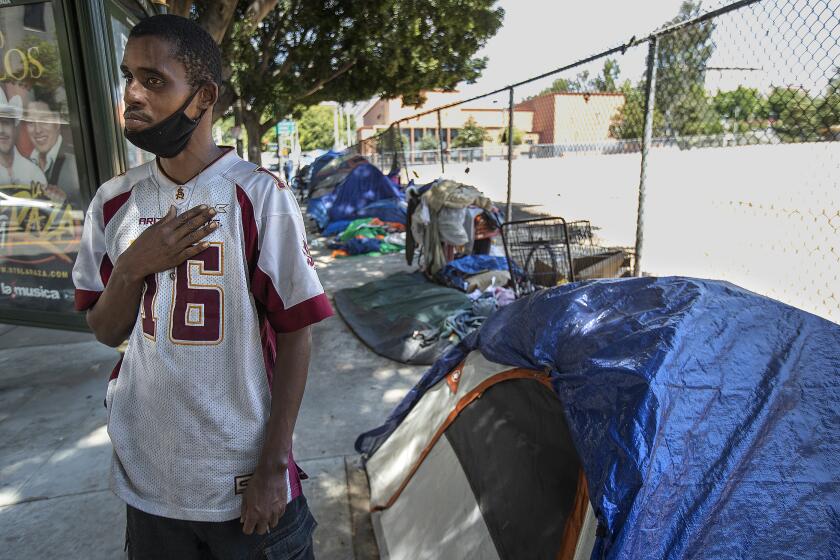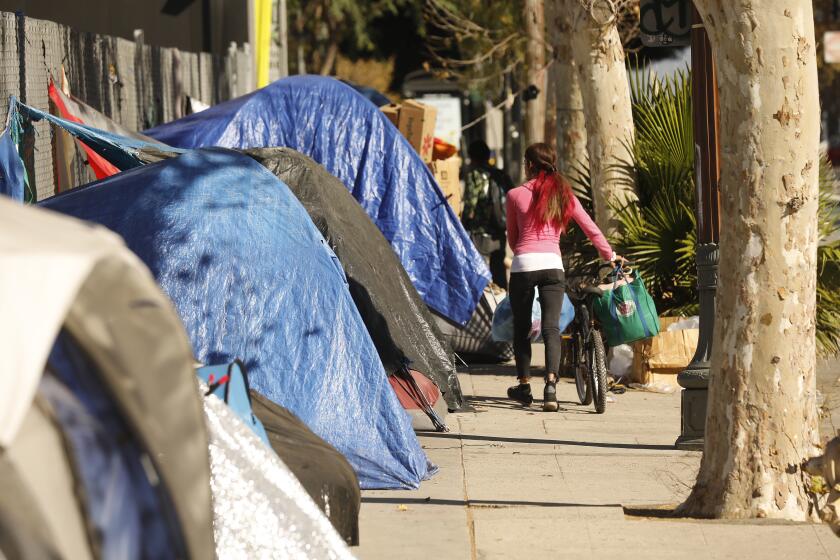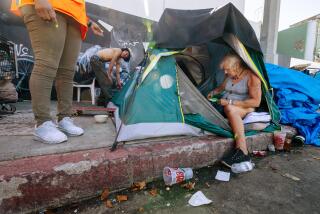Editorial: Bass has declared homelessness an emergency. Now let’s see bold action
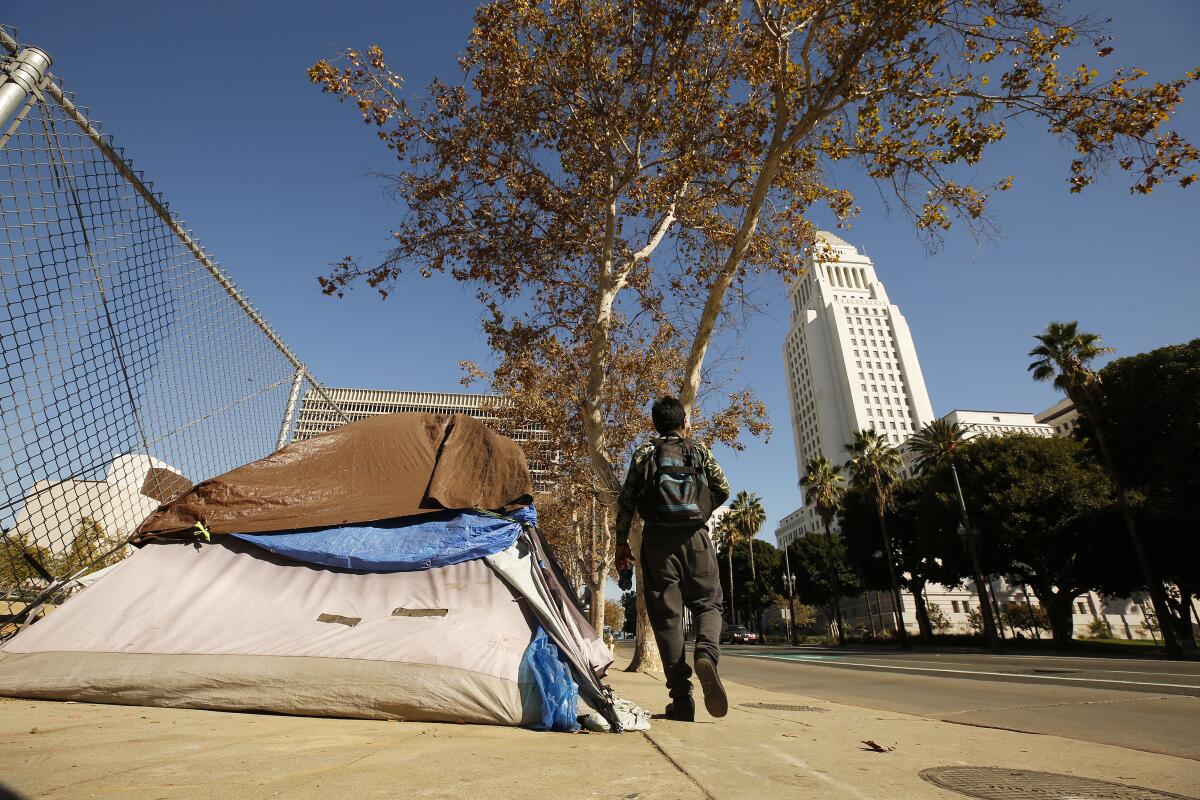
- Share via
One of the most repeated mantras in Los Angeles is that homelessness is an emergency and should be treated as such. But this page has been skeptical that an official emergency declaration was necessary; it seemed more a publicity stunt than a pathway to reducing homelessness.
Still, during the mayoral campaign, most candidates promised they would declare a state of emergency. And on Monday, her first day on job, Mayor Karen Bass will do just that. Last week, Bass spoke with an editorial writer about why the official declaration is important and how it will help her team address the humanitarian crisis of homelessness.
“I realize I’m taking a huge risk by declaring, on my first day, this state of emergency,” Bass said Friday. “I’ve always felt it’s an emergency if you have 40,000 people on the street.”
Bass will take the helm of a city in desperate need of leadership. She will need to quickly show residents that she’s in charge and ready to make change.
A declaration of emergency will allow the mayor to activate an emergency operations team and act as its director; expedite development permits, contracting, procurement and hiring; suspend certain rules and regulations, and let affordable housing projects already allowed by law skip lengthy additional review by city departments and city and area planning commissions. Department managers will become part of Bass’ emergency team, and they will be under her orders to facilitate housing plans.
Bass said the order will allow her to demand that departments identify all city-owned properties that can be used for housing. It can also help speed up the leasing and purchase of motels, hotels and apartment buildings for homeless housing. She wants to extend the Project Roomkey program created during the pandemic in which the city rented out entire hotels and motels for temporary housing, but it’s unclear if the Federal Emergency Management Agency will continue to reimburse the city for the expense.
The emergency declaration will also give Bass the ability to commandeer private property for housing, but she is not interested in doing that. “You’re going to end up tied up in court forever. I’m looking for the quickest way to do this.”
The voters have spoken and Mayor-elect Karen Bass has broad support to start solving the homelessness crisis.
Speed is important because Bass promised during the campaign to move 17,000 people off the streets into housing. She and Mercedes Márquez, her new chief of Housing and Homelessness Solutions, plan an encampment-by-encampment approach. Márquez said the goal would be to move people living in encampments into interim housing “for as short a period of time as possible as we push for permanent housing.” Both are consulting with Va Lecia Adams Kellum, the chief executive of St. Joseph Center, a service provider that successfully moved about 200 people off the Venice boardwalk last year, with most going into interim and permanent housing.
“I think it’s important that people see a difference — and people have lost faith,” Bass said, adding that she’s not concentrating on housing encampments solely to placate neighborhoods. “I would do this anyway because it’s the right thing to do.”
Many of these strategies have already been tried by Mayor Eric Garcetti and the City Council. There were tallies of public land for housing and efforts to improve cooperation between departments, for example. But progress has still been slow and stymied. An emergency declaration may help cut through some red tape; the power of the declaration will ultimately depend on how Bass chooses to wield it within city government. Will she quickly hire more outreach workers and service providers? Will she swiftly transform underutilized city buildings into housing? Will department heads get the message that permitting and inspecting of homeless housing projects must be prioritized above all else?
Homeless numbers rose significantly less in the past two years. Experts say if we want them not to shoot up again, keep tenant protections in place.
An emergency declaration won’t necessarily help with other crucial areas, such as securing more mental health and drug treatment support and federal housing vouchers. That’s why Bass is investing a lot of time in meeting with the Los Angeles County supervisors and officials from county health departments. She will need to use her talent for coalition building here because, as she acknowledges, the county supplies the supportive services that so many homeless people need when they get housing.
She’s also appealed to President Biden to help. Federal housing vouchers aren’t worth enough in a high-rent city like Los Angeles, and the federally required vetting of an apartment where a voucher will be used takes too long, Bass said. “I’ve said this to the administration — there are so many rules and regulations in place that make no sense when you are facing an emergency.”
After Bass signs the declaration, the City Council will have to ratify it. She said she has already talked with every council member and believes most are willing to vote for it.
Will this declaration allow her to meet her campaign pledge to move 17,000 people off the street in a year? “You know, I am going to work day in and day out to do that. That’s why I did this.”
We say: Go for it. Make the most of the emergency declaration. At this point, in a city of 42,000 homeless people where more fall into homelessness most years than are permanently housed, the mayor needs every tool at her disposal. And the city needs a mayor who is willing to use them.
More to Read
A cure for the common opinion
Get thought-provoking perspectives with our weekly newsletter.
You may occasionally receive promotional content from the Los Angeles Times.
